Related Research Articles

South African English is the set of English language dialects native to South Africans.

Zulu, or isiZulu as an endonym, is a Southern Bantu language of the Nguni branch spoken and indigenous to Southern Africa. It is the language of the Zulu people, with about 13.56 million native speakers, who primarily inhabit the province of KwaZulu-Natal in South Africa. Zulu is the most widely spoken home language in South Africa, and it is understood by over 50% of its population. It became one of South Africa's 12 official languages in 1994.
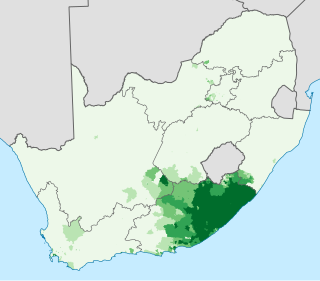
Xhosa, formerly spelled Xosa and also known by its local name isiXhosa, is a Nguni language, indigenous to Southern Africa and one of the official languages of South Africa and Zimbabwe. Xhosa is spoken as a first language by approximately 10 million people and as a second language by another 10 million, mostly in South Africa, particularly in Eastern Cape, Western Cape, Northern Cape and Gauteng, and also in parts of Zimbabwe and Lesotho. It has perhaps the heaviest functional load of click consonants in a Bantu language, with one count finding that 10% of basic vocabulary items contained a click.

Swazi or siSwati is a Bantu language of the Nguni group spoken in Eswatini and South Africa by the Swati people. The number of speakers is estimated to be in the region of 4.7 million including first and second language speakers. The language is taught in Eswatini and some South African schools in Mpumalanga, particularly former KaNgwane areas. Siswati is an official language of Eswatini, and is also one of the twelve official languages of South Africa.
The Nguni languages are a group of closely related Bantu languages spoken in southern Africa by the Nguni people. Nguni languages include Xhosa, Hlubi, Zulu, Ndebele, and Swati. The appellation "Nguni" derives from the Nguni cattle type. Ngoni is an older, or a shifted, variant.
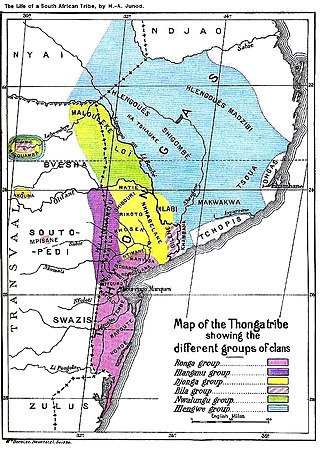
The Tsonga people are a Bantu ethnic group primarily native to Southern Mozambique and South Africa. They speak Xitsonga, a Southern Bantu language. A very small number of Tsonga people are also found in Zimbabwe and Northern Eswatini. The Tsonga people of South Africa share some history with the Tsonga people of Southern Mozambique, and have similar cultural practices, but differ in the dialects spoken.

At least thirty-five languages are spoken in South Africa, twelve of which are official languages of South Africa: Ndebele, Pedi, Sotho, South African Sign Language, Swazi, Tsonga, Tswana, Venda, Afrikaans, Xhosa, Zulu and English, which is the primary language used in parliamentary and state discourse, though all official languages are equal in legal status. In addition, South African Sign Language was recognised as the twelfth official language of South Africa by the National Assembly on 3 May 2023. Unofficial languages are protected under the Constitution of South Africa, though few are mentioned by any name.
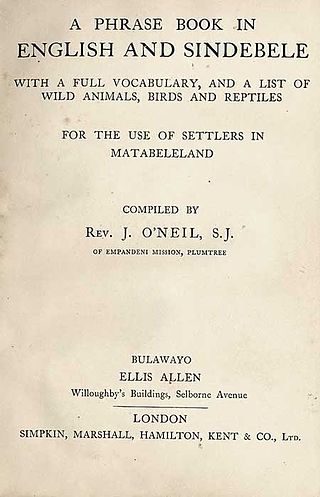
Northern Ndebele, also called Ndebele, isiNdebele saseNyakatho, Zimbabwean Ndebele or North Ndebele, associated with the term Matabele, is a Bantu language spoken by the Northern Ndebele people which belongs to the Nguni group of languages.
Fanagalo, or Fanakalo, is a vernacular or pidgin based primarily on Zulu with input from English and a small amount of Afrikaans input. It is used as a lingua franca, mainly in the gold, diamond, coal and copper mining industries in South Africa and to a lesser extent in the Democratic Republic of the Congo, Namibia, Zambia, and Zimbabwe. Although it is used as a second language only, the number of speakers was estimated as "several hundred thousand" in 1975. By the time independence came–or in the case of South Africa, universal suffrage–English had become sufficiently widely spoken and understood that it became the lingua franca, enabling different ethnic groups in the same country to communicate with each other, and Fanagalo use declined.
Phuthi (Síphùthì) is a Nguni Bantu language spoken in southern Lesotho and areas in South Africa adjacent to the same border. The closest substantial living relative of Phuthi is Swati, spoken in Eswatini and the Mpumalanga province of South Africa. Although there is no contemporary sociocultural or political contact, Phuthi is linguistically part of a historic dialect continuum with Swati. Phuthi is heavily influenced by the surrounding Sesotho and Xhosa languages, but retains a distinct core of lexicon and grammar not found in either Xhosa or Sesotho, and found only partly in Swati to the north.
Mnguni was the leader of the Nguni nation in who reached Southern Africa migrating from the North and also the father of King Xhosa. The Xhosa people, today considered a sub-nation of the Nguni nation, were historically referred to as AbeNguni. Mnguni's name derives from the word Nguni, the name for the major ethnicity in South Africa. It now includes the Zulus, Xhosas, Ndebeles and Swazis among others.
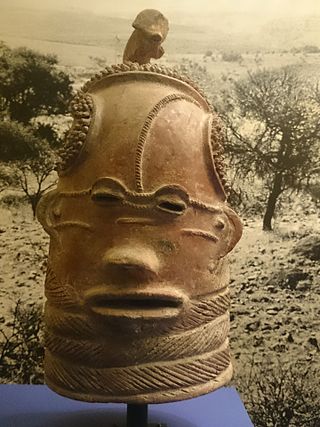
South African Bantu-speaking peoples represent the majority ethno-racial group of South Africans. Occasionally grouped as Bantu, the term itself is derived from the English word "people", common to many of the Bantu languages. The Oxford Dictionary of South African English describes "Bantu", when used in a contemporary usage or racial context as "obsolescent and offensive", because of its strong association with the "white minority rule" with their Apartheid system. However, Bantu is used without pejorative connotations in other parts of Africa and is still used in South Africa as the group term for the language family.

The Nguni people are a linguistic cultural group in southern Africa made up of Bantu ethnic groups from central Africa, with offshoots in neighboring countries in Southern Africa. Swazi people live in both South Africa and Eswatini, while Ndebele people live in both South Africa and Zimbabwe.

The Bhaca people or amaBhaca are an Nguni ethnic group in South Africa.

The Hlubi people or AmaHlubi are an AmaMbo ethnic group native to Southern Africa, with the majority of population found in Gauteng, Mpumalanga, KwaZulu-Natal and Eastern Cape provinces of South Africa.
The Southern Bantu languages are a large group of Bantu languages, largely validated in Janson (1991/92). They are nearly synonymous with Guthrie's Bantu zone S, apart from the exclusion of Shona and the inclusion of Makhuwa. They include all of the major Bantu languages of South Africa, Botswana, Lesotho, Eswatini, and Mozambique, with outliers such as Lozi in Zambia and Namibia, and Ngoni in Zambia, Tanzania and Malawi.
Nhlangwini/Ntlangwini (Hlangwane) is a Bantu language of South Africa. It is located along the border between Xhosa and Zulu, but is more closely related to Swazi.
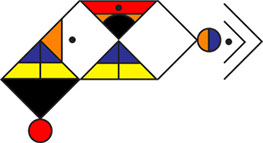
Ditema tsa Dinoko, also known as ditema tsa Sesotho, is a constructed writing system for the siNtu or Southern Bantu languages. It is also known by its IsiZulu name isiBheqe soHlamvu, and by various other names in different languages. It was developed in the 2010s from antecedent ideographic traditions of the Southern African region. Its visual appearance is inspired by these, including the traditional litema arts style. It was developed between 2014 and 2016 by a group of South African linguists and software programmers with the goal of creating a denser writing system to avoid the slowness in reading caused by the word length and visual homogeneity of Southern Bantu languages written in the Roman alphabet. As of 2023, no proposal has been made to encode the script in Unicode, the text encoding standard designed to support all of the world's major writing systems.
Sabela is a dialect of several major South African languages used primarily in South Africa. Sabela was originally developed inside national prisons as a means of communication within gangs, primarily The Numbers Gang. Since then, released inmates have brought the language out to the general populace of South Africa. UkuSabela means to respond in various Nguni languages.

The Mpondomise people, also called Ama-Mpondomise, are a Xhosa-speaking people. Their traditional homeland has been in the contemporary era Eastern Cape province of South Africa, during apartheid they were located both in the Ciskei and Transkei region. Like other separate Xhosa-speaking kingdoms such as Aba-Thembu and Ama-Mpondo, they speak Xhosa and are at times considered as part of the Xhosa people.
References
- 1 2 Jouni Filip Maho, 2009. New Updated Guthrie List Online
- ↑ "A comparative phonological and morphological analysis of the North and South Lala dialects of Tekela Nguni" (PDF). University of South Africa (UNISA). 1999-12-01. Retrieved 2015-09-17.